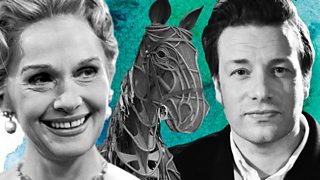Seven things we learned from Keir Starmer's Desert Island Discs
Over the decades, numerous politicians have been cast away to Radio 4’s desert island, departing the corridors of power for a solitary life with just eight discs, a book and a luxury item. Sir Keir Starmer, the leader of the opposition, is the latest to accept the invitation. (Boris Johnson was cast away back in 2005.) During the programme he reflects on his childhood, his early political interests, his work as a lawyer and as Director of Public Prosecutions, as well as his more recent political career. Here are the things we learned from his Desert Island Discs...

1. His music choices are all his own
Whenever a politician appears on Desert Island Discs, sceptics wonder whether the chosen tracks have been approved or even curated by special advisers, or run past a focus group. Keir Starmer insists that his eight discs are definitely his own personal selection: “if you run into anyone who has known me for a long time, they will tell you this is the genuine Keir Starmer list.”
2. Public speaking as a politician is very different from speaking as a barrister
“They are completely different. If you’re a lawyer it’s based on the facts, it’s a proper argument, there’s a judge who makes the decision. In politics it’s completely different because it’s a different art of persuasion.” Presenter Lauren Laverne points out that some commentators have accused him of being too ‘lawyerly’ as a politician, and lacking charisma. He responds by saying: “they’ve said a lot worse than that. It’s water off a duck’s back. I am who I am. I know what I am. I know what I believe in and I know what I’ve got to do and that’s what I’m focused on.”
3. The 2019 election and the pledge to hold a second EU referendum
Some say his decision to include a second referendum with Remain on the ballot in the Labour manifesto cost the party the 2019 election. “Of course I acknowledge this came up on the doorstep in different ways across the country,” he says. “In the North West, North East and parts of the Midlands it came up in a negative way, I’ve got to accept that and that’s a fair challenge. Obviously it was differently received in places like Scotland. There was never an easy position for our party in that election but I think the important thing now is to recognise we’ve left the EU. Leave – Remain is over and now we’ve got to aim for the best deal we can have with the EU and move forward and build on that.”

4. His teenage political campaigning found little success
“I joined the East Surrey Young Socialists when I was 16, which was the youth section of the local Labour Party. I have to say in East Surrey there weren’t very many of us. I think it numbered about four in total.” He readily admits that their campaigning was received “pretty negatively as we marched round East Surrey, up long drives, telling people that we thought nationalisation was the answer. After we’d explained our views and asked ‘how will you be voting?’ there weren’t so many who were persuaded by what we were putting to them.”
5. He owes his legal career to his parents
As a young activist, he considered studying politics at university – but his parents thought otherwise: “they said 'No, you want to do law'. I arrived at university, I had never met a lawyer, I didn’t really know what lawyers did, I don’t think I knew the difference between a solicitor and a barrister, but this was for me an incredible journey – boy from Oxted goes to Leeds University.” It was there that he first gained an interest in human rights law, which became an important part of his legal career.
6. Football is a lifelong passion
“I’ve been playing football every week since I was 10,” he says, and so it’s perhaps not a surprise to find that one of his discs for the island is Three Lions by Baddiel, Skinner and the Lightning Seeds, the England anthem from the Euro 96 tournament: “in order to appreciate this song, you had to be in Wembley, in the crowd – I was in the upper tier – for the semi-final when we were playing Germany, and for the whole stadium to be jumping up and down, rocking to this [song].” And his choice of luxury? A football.
7. He was so driven that he nearly lost his television
As a young lawyer he was sharing a flat in London and was busy working on his Amstrad computer, “bashing away, deep in thought and one of the other people in the flat came back up and said ‘Keir what are you doing? Did you not notice?’ and my flatmate had intercepted two people who were walking out of our flat with our television. I’d been oblivious to the fact that we were being burgled. I was actually in the next room while they were taking the television without any knowledge of what was happening around me.”

More from Desert Island Discs
-
![]()
Can you identify 12 castaways from their luxury choice?
-
![]()
20 episodes to download and listen to on holiday (for every type of summer break).
-
![]()
Including the guest that picked her own music and the creation of a famous play.
-
![]()
With over 2,000 episodes available to download. Make Desert Island Discs your luxury item.





